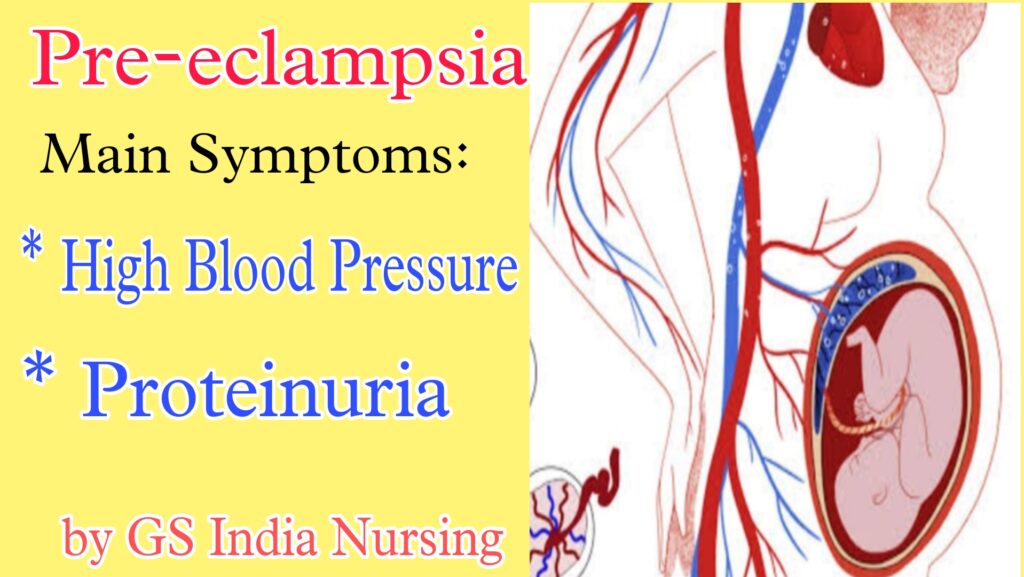Definition:-
Pre-Eclampsia is a multisystem disorder which is characterised by development of hypertension up to 140/90 mmHg or more with proteinuria after 20th week in pregnancy in a previously normotensive and proteinaric patient.

Causes:-
The exact cause of Pre-Eclampsia likely involves severe factors. Experts believe it begins in the placenta– the organ that nourishes the fetus throughout pregnancy. Early in a pregnancy new blood vessels develop and evolve to supply oxygen and nutrients to the placenta.
In women with preeclampsia these blood vessels don’t seem to develop or work properly problems with woh will blood circulates in the Placenta may lead to the irregular regulation of blood pressure in the mother.
Other high blood pressure disorders during pregnancy.
Preeclampsia is one high blood pressure (hypertension) disorder that can occur during pregnancy other disorders can happen too,
- Gestational hypertension: is high blood pressure that begins after 20 weeks, without problems in the Kidneys or other organs. Some women with gestational hypertension may develop preeclampsia.
- Chronic hypertension: is high blood pressure that was present before pregnancy or that occurs before 20 weeks of pregnancy high blood pressure that continuous more than three months after a pregnancy also each called chronic hypertension.
- Chronic hypertension with superimposed preeclampsia: occurs in women diagnosed with chronic high blood pressure before pregnancy, who then develop worsening high blood pressure and protein in the urine or other health complications during pregnancy.
Rics factors:-
- Preeclampsia in a previous pregnancy.
- Being pregnant with more than one baby.
- Chronic high blood pressure (hypertension).
- Type 1 aur type 2 diabetes before pregnancy.
- Autoimmune disease.
- Kidney disease.
- Use of in vitro fertilization.
Conditions that are associated with a moderate Ricks of developing preeclampsia include.
- First pregnancy with current partner.
- Obesity.
- Maternal age of 35 or older.
- More than 10 years since previous pregnancy.
- Complications in a previous pregnancy.
- Family history or preeclampsia.
Symptoms:-
The defining feature of preeclampsia is high blood pressure, proteinuria, aur other signs of damage to the Kidneys or other organs. You may have no noticeable symptoms. The first signs of preeclampsia are often detected during routine prenatal visits a health Care provider.
Along with high blood pressure preeclampsia signs and symptoms may include.
- Nausea or vomiting.
- Severe Headache.
- Pain in the upper belly usually under the ribs on the right side.
- Shortness of breath caused by fluid in the lungs.
- Changes in vision including temporary loss of vision, blurred vision, or light sensitivity.
- Excess protein in urine (proteinuria) other sign of kidney problem.
- Decreased levels of platelets in blood (thrombocytopenia).
- Increased liver enzymes that indicate liver problems.
Weight gain and swelling (edema) are typical during health pregnancies. However, sudden weight gain or a sudden appearance of edema particularly in your face and hands may be a sign of preeclampsia.
Complications:-
Complications of preeclampsia may include.
Fetal growth restriction:- Preeclampsia effects the arteries carrying blood to the Placenta. if the Placenta doesn’t get enough blood, the baby may receive inadequate blood and oxygen and fewer nutrients. These can lead to slow growth known as fetal growth restriction.
Preterm birth:- Preeclampsia may lead to an unplanned preterm birth. Delivery before 37 weeks. Also planned preterm birth is a primary treatment for preeclampsia. A baby born prematurely has increased risk of breathing and feeding difficulties, vision or hearing problems, developmental delays and cerebral palsy. Treatments before preterm delivery may decrease some risks.
- Hemorrhage.
- Oliguria.
- Anuria.
- Weakness of sight.
- Preterm labour.
- HELLP syndrome.
- PPH (Post partum hemorrhage).
Fetal complications:-
- IUGR (Intra uterine growth Restriction).
- IUD (Intra uterine death).
- Prematurity.
- Asphyxia.
- Shock.
- Sepsis.
- Residual hypertension.
- Chronic renal disease.
Diagnosis:-
A diagnosis of preeclampsia happens if you you have high blood pressure after 20 weeks of pregnancy and at least one of the following findings.
- Protein in your urine (Proteinuria) indicating an impaired kidney.
- Other signs of kidney problems.
- A low blood platelet count.
- Elevated liver enzymes showing an impaired liver.
- New Vision disturbances.
- New headaches that don’t go away after taking pain medication.
- Fluid in the lungs (Pulmonary edema).
Additional tests:-
- Physical examination.
- History collection.
- Urine Examination.
- Liver function test.
- Blood examination.
- Antenatal fetal monitoring.
- Ultrasonography.
- X-ray.
Fetal well-being-
- Nonreactive nonstress test (NST).
- Contraction stress test (CST).
- Biophysical probile (BPP).
- Cardiotocography (CTG).
Treatment:
The primary treatment for preeclampsia is either to delivery the baby or manage the condition until the best time to deliver the baby. This decision with your health care provider will depend on the severity of preeclampsia, the gestational age of your baby, and the overall health of you hand your baby.
Treatment of severe preeclampsia:
Severe preeclampsia requires that you be in the hospital to monitor your blood pressure and possible complications. your health care provider will frequently monitor the growth and well being of your baby.
Medications to treat severe preeclampsia usually include.
- Antihypertensive drugs to lower blood pressure.
- Anticonvulsant medication, such as magnesium sulphate, to prevent Seizures.
- Corticosteroids (lungs maturity) to promote development of your baby’s lungs before delivery.
Prevention:-
Can you prevent preeclampsia. Talking a baby aspirin daily has been demonstrated to decrease your risk of developing preeclampsia by approximately 15℅ . If you have risk factors for preeclampsia, your health care provider may recommend starting aspirin in early pregnancy (by 12 weeks gestation).
Diet for preeclampsia:-
- Consume adequate salt & electrolytes.
- Eat a lower-carb, low-glycemic diet.
- Consume adequate amounts of protein especially glycine-rich sources of protein.
- Consider supplementing with magnesium.
- Ensure you consume enough choline.
I hope that you liked this article…………!!
Thanking you…………!!
By GS India Nursing, Lucknow, India….. !!